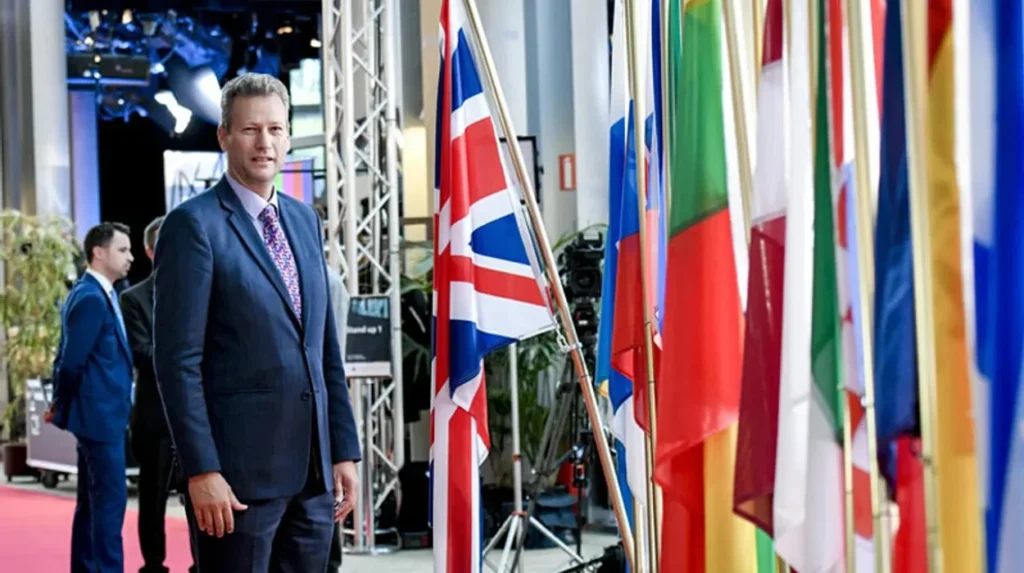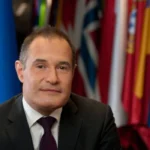A former Brexit Party Member of the European Parliament (MEP) has publicly admitted to accepting bribes to promote Russian interests, shedding light on the murky nexus of political influence and foreign interference. The confession has sparked intense scrutiny over the integrity of political processes and raised urgent questions about Russia’s covert efforts to shape European policies.
The ex-MEP, known for a staunchly nationalist stance during the Brexit debates, acknowledged receiving significant payments in exchange for advocating positions beneficial to Moscow. This admission came during an exclusive interview, where he detailed how the arrangement unfolded and the motivations behind his actions. He stated,
“I was approached with a lucrative offer, and the money was hard to resist in a precarious political climate.”
The revelation unfolds against a backdrop of growing anxieties across Europe regarding Kremlin-backed disinformation campaigns and political manipulations. Security analysts have cautioned that such influence operations undermine democratic institutions and exacerbate geopolitical tensions. The former MEP’s confession thus serves as a sobering reminder of the vulnerability within Western political frameworks.
The Context of the Admission
The Brexit Party, once a formidable force advocating for the United Kingdom’s departure from the European Union, has long been under the spotlight for various controversies. However, the involvement of one of its prominent former representatives in accepting Russian bribes amplifies concerns about foreign interference during a period of profound political upheaval.
Explaining the context, the former MEP revealed how Russian contacts initiated the covert operations, providing substantial financial incentives to champion policies that aligned with Moscow’s strategic objectives.
“Their interest was clear: to weaken EU cohesion and foster divisions among member states,”
he said, highlighting the geopolitical game at play.
This admission aligns with broader investigations by European security and intelligence agencies, which have cataloged a series of covert operations aimed at influencing elections, spreading disinformation, and corrupting key policymakers. The European Parliament itself has launched inquiries into political financing and lobbying practices related to foreign actors.
Implications for European Politics and Security
The impact of this confession extends well beyond a singular case of political corruption. It calls into question the robustness of safeguards against foreign influence within European political institutions and fuels debate on necessary reforms. Several policymakers reacted with condemnation and demands for swift action to prevent future abuses.
One senior European security official remarked,
“This case exposes the cracks in our defenses against malign foreign operations. We must bolster transparency and accountability to protect our democracy.”
There is an increased urgency to review the mechanisms that regulate lobbying and campaign financing within the European Union to close any loopholes exploited by foreign entities.
From a security perspective, this incident highlights the sophisticated methods used by Russia to project power beyond its borders. Analysts observe that bribing elected officials represents a potent tool for influencing EU policies, especially in contentious areas such as energy dependence, defense budgets, and sanctions regimes.
The Former MEP’s Role and Actions
The former Brexit Party MEP admitted to actively promoting narratives that favored Russia’s interests during his tenure. These included undermining support for sanctions targeting Russian actions in Ukraine and advocating for policies that would reduce European energy diversification efforts, thereby increasing reliance on Russian gas.
He recounted specific moments when he influenced parliamentary debates and voting patterns, stating,
“I often framed arguments around sovereignty and economic pragmatism, but behind the scenes, the motivation was linked to the financial arrangements.”
His confession also revealed the methods by which payments were channeled discreetly, involving intermediaries and cash transfers designed to evade detection. Authorities are now investigating the full extent of the network that facilitated these bribes, potentially implicating other figures connected to broader influence campaigns.
Reactions from Political Parties and Institutions
The news has generated immediate reactions across the political spectrum. Former allies condemned the breach of trust, with one party spokesperson emphasizing,
“This betrayal undermines the very principles we stood for. We call for full transparency and cooperation with investigations.”
European Parliament leadership has pledged to increase oversight and tighten ethics rules. An official statement stressed,
“We deeply regret this incident and reaffirm our commitment to safeguarding the integrity of our institutions against foreign interference.”
In the United Kingdom, politicians underscored the importance of maintaining vigilance against external attempts to influence domestic politics, especially as the UK navigates its post-Brexit relationships and security partnerships.
Broader Context of Russian Influence
This admission is part of a larger pattern of Russian efforts to infiltrate and influence Western democracies. Over the past decade, numerous reports have cataloged Russia’s use of disinformation campaigns, cyberattacks, and covert financing as strategic tools to weaken adversaries and extend geopolitical influence.
Experts note that the willingness of a former MEP to accept bribes points to vulnerabilities that are exploited through economic incentives, especially targeting politicians who may be struggling for financial resources or marginalized within their political landscape.
A European analyst specializing in Russian foreign policy remarked,
“Russia knows that direct military confrontation is costly and risky. Instead, it uses a hybrid approach, employing political subversion and corruption as force multipliers.”
Legal and Investigative Developments
Following the admission, a formal investigation has been launched by law enforcement agencies in coordination with European anti-corruption bodies. Authorities are probing the source of the bribes, the extent of the payments, and any additional individuals involved in the scheme.
The former MEP faces potential criminal charges related to corruption and breaches of parliamentary conduct codes. Legal experts suggest that if proven, this case could set a significant precedent for prosecuting illicit foreign interference in European democratic processes.
Meanwhile, the European Parliament has proposed new legislation aimed at raising transparency standards for lobbying and tightening the rules around financial disclosures by parliamentarians. These measures are intended to restore public confidence and strengthen defenses against similar future breaches.
The Public and Media Response
The media has covered the story extensively, emphasizing the necessity for accountability and institutional reform. Public reaction has been marked by a mixture of shock, anger, and calls for stronger mechanisms to detect and deter political corruption tied to foreign influence.
Civil society organizations advocating for transparency and democracy have seized on the case to highlight systemic vulnerabilities. They argue that building resilient political systems requires continuous vigilance, public engagement, and robust legal frameworks.
The admission by a former Brexit Party MEP to accepting bribes to promote Russian interests marks a critical moment in the ongoing battle against foreign interference in European politics. It exposes the fragility of democratic safeguards and reaffirms the need for vigilant oversight, legal reforms, and international cooperation.
As investigations proceed, the case will likely influence policy debates on the integrity of political institutions and the strategies to counter concerted efforts by foreign powers to destabilize democratic governance in Europe.







